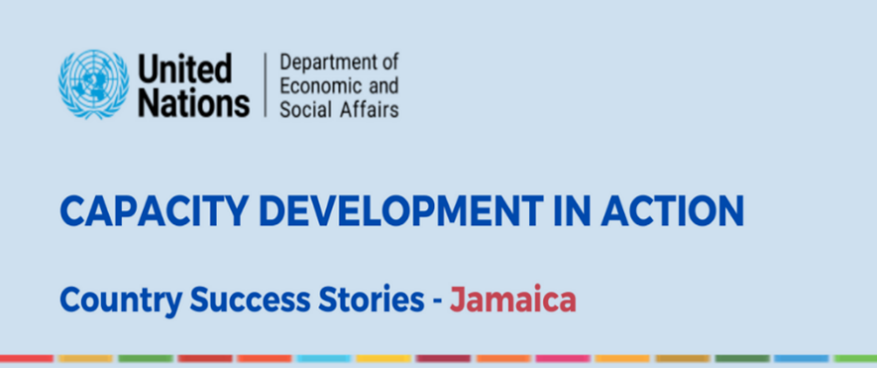CHALLENGE
Jamaica's mountainous topography, coastal character, and distribution of resource endowments have influenced settlement patterns, livelihoods strategies, and patterns of economic development. As a SIDS, Jamaica is highly dependent on the services, resources, and opportunities provided by, and in, its coastal and ocean spaces. The Council on Ocean and Coastal Zone Management (COCZM) was established in 1998 with a mandate to define the national policy for ocean and coastal zone management. Jamaica's Ocean and Coastal Zone Management (OCZM) Policy has not had the intended impact due to policy implementation barriers created by inadequate resourcing, lack of legal standing, and weak institutional arrangements. The need for enhanced enabling arrangements for the implementation of the policy are evident.
There was broad agreement that the national OCZM policy must be revisited and updated. A considerable amount of time has elapsed since the policy was promulgated in 2022. In this time, new policies, development perspectives, and paradigms have come to the fore. The updating and revision of the OCZM Policy must take these developments into account while ensuring coherence among policies and sectoral interests that impact the coastal zone. Ensuring that policy coherence is achieved in the revision of the OCZM policy required the introduction and employment of systems thinking. This is critical for effective policy design. As a process, systems thinking can facilitate the meaningful engagement of all OCZM stakeholders, enhance transparency, understanding, and accountability in decision-making, catalyze stakeholder buy-in and ownership of the intended policy direction and outcomes, and ensure alignment with the national Vision 2030 development goals.
SUPPORT PROVIDED
In 2018, the Ministry of Foreign Affairs and Foreign Trade (MFAFT) requested UN DESA’s SIDS Unit to provide support in developing their capacity to design and implement appropriate enabling legal, institutional and policy frameworks to grow sustainable ocean-based economies and to derive economic benefits from harnessing the productive potential of their ocean spaces. In the process, the project aimed at eliciting recommendations from a variety of OCZM stakeholders on the institutional capabilities (experience, aptitudes, proficiency, and competencies) required to effectively coordinate and implement the review and revision of Jamaica’s national Ocean Coastal Zone Management (OCZM) Policy. In response to this request UN DESA organised a programme of consultation and assessment through its Development Account Project DA 1819b entitled “Bridging capacity gaps in the implementation of the 2030 Agenda, with a particular focus on SDG 14 and SDG 16”. The project team, including DPIDG and DSDG of UN DESA, engaged with a wide range of stakeholders and provided guidance and recommendations on the institutional capabilities (experience, aptitudes, proficiency, and competencies) required, and available opportunities, for effectively coordinating and implementing the review and revision of Jamaica’s national Ocean Coastal Zone Management (OCZM) Policy and establishing its enabling framework.
APPROACH ADOPTED
The approach adopted included 4 phases as follows (see Figure 1 below): Phase I: The 2019 Baseline Assessment produced a roadmap to guide the review and rationalisation of the governance and enabling arrangements for Jamaica’s OCZM Policy and sector. The roadmap was endorsed by Jamaica’s National Council for Ocean and Coastal Zone management (NCOCZM), the GoJ’s OCZM coordinating body; Phase 2: In keeping with the recommendations of the roadmap, UN DESA supported the development of an M&E framework for the OCZM Policy, and a review and rationalisation of the national OCZM Policy, legislation, and institutional arrangements. The main output of the review and rationalisation exercise were the recommendation for the institutional options for OCZM Coordinating Entity and OCZM Implementation Entity; Phase 3: UN DESA’s support to the consultative process for reviewing the institutional options for OCZM Implementing Entity (IE) and OCZM Coordinating Entity (CE). Phase 4: The operationalisation of the institutional arrangements for OCZM to set the stage for the review and updating of the OCZM Policy and the development of dedicated ICZM legislation.
RESULTS
The project resulted in the following outcomes:
• Baseline Assessment of OCZM sector and policy.
• Revised M&E Framework for the OCZM Policy.
• Analysis of the governance and enabling environment, and institutional arrangements, for the revision and updating of the OCZM Policy.
• Options for institutional models for coordinating and implementing the policy review and revision process.
• Stakeholder recommendations for the institutional models for coordinating and implementing the revision and updating of the OCZM Policy.
• A sustainability strategy to support the implementation of the revised and updated OCZM Policy incorporating policy coherence and systems thinking.
• Commitment from the UN RR to coordinate support and input from development partners for the revision and updating of the OCZM Policy.
LESSONS LEARNED
The consultative process undertaken by UN DESA has been central to its success. Consultations with the PIOJ, MFAFT, and NEPA facilitated early adjustments to project assumptions. A formal and explicit connection between economic and environmental benefits would create potential access to innovative financing opportunities. Connecting the OCZM Policy revision and updating process to the Blue Economy discussions would help to advance the integration of environmental and governance issues in economic and social decision-making processes. The national consultation process has proven to be very meaningful, ensuring that the review and assessment of Jamaica’s OCZM policy and sector has been facilitated by UN DESA but owned and directed by the Government of Jamaica and Jamaica’s OCZM stakeholders.
 Welcome to the United Nations
Welcome to the United Nations
